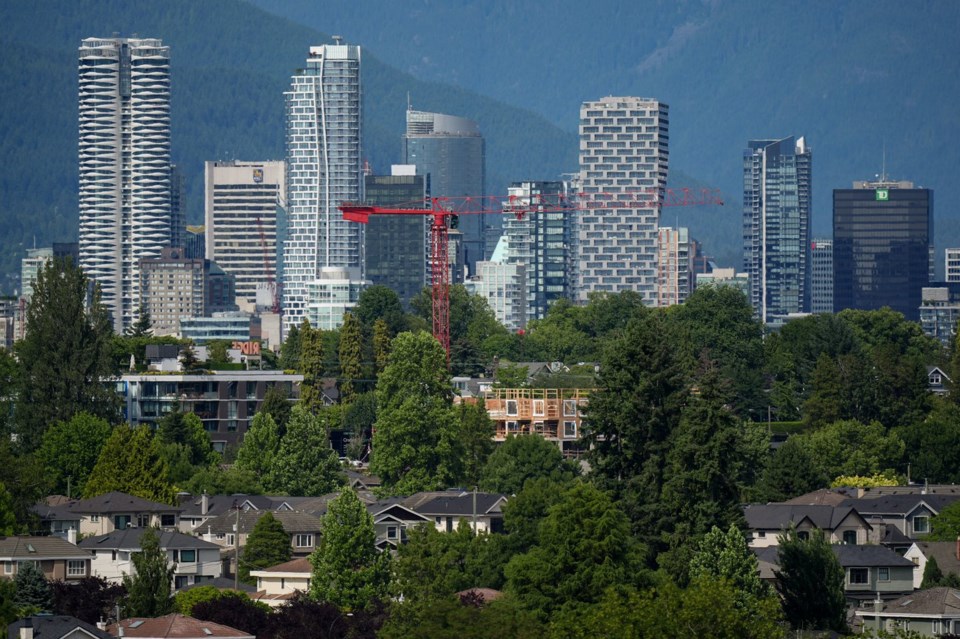While optimism is building in some parts of Canada for a rebound in the real estate market, condominium dwellers wanting to move up to a larger space face tough choices amid little sign of improvement for that segment.

While optimism is building in some parts of Canada for a rebound in the real estate market, condominium dwellers wanting to move up to a larger space face tough choices amid little sign of improvement for that segment.
Cities like Toronto and Vancouver have seen condo sales drop off, if not stagnate, in recent years following a rush of new supply opening up and plummeting investor demand.
For some regions, that marks a divergence from the overall real estate picture. Many industry watchers are now forecasting a turnaround in the housing market in the coming months after the first half of 2025 was plagued by economic uncertainty related to tariffs and job losses.
It’s left those looking to leave condo life behind and upgrade to a house in a tough spot: sell now at a lower than anticipated value, or wait out the storm.
“They’re kind of stuck,” said Victor Tran, a mortgage and real estate expert for Rates.ca.
“They hoped to bank on the appreciation of the condo in the coming years so they can pull that money out and use that as a down payment to upgrade to a larger home. But the money is just not there anymore.”
Since 2022, condo apartment sales have dropped by 75 per cent in the Greater Toronto Area and 37 per cent in the Vancouver area, respectively, said a report last month by Canada Mortgage and Housing Corp. Meanwhile, inventories have more than doubled and prices fallen in those regions.
The national housing agency said the condo market is expected to remain weak as completions “remain near record levels and demand remains subdued.” It added there is little evidence to suggest price declines will quickly reverse “given the national and global economic outlook.”
“There are certain (situations) where sellers have just decided to hit the sell button and take a loss on their condos, unfortunately, and just move on,” said Adil Dinani, a Vancouver-based real estate agent at Royal LePage West Real Estate Services.
“There’s a lack of liquidity in the condo market, so that’s preventing potential move-up buyers from reallocating that money, or buyers from moving up in the market, potentially, because their condos aren’t worth what they expected them to be worth.”
A report released by the Toronto Regional Real Estate Board in May showed condo apartment sales in the Greater Toronto Area were down 21.7 per cent in the first quarter of this year compared with the first three months 2024. Meanwhile, new listings in the quarter were up 25.2 per cent year-over-year for that segment.
Condo sales were down 2.5 per cent last month on a year-over-year basis, roughly in line with overall home sales trends for the region. However, that came after activity in the condo market declined 25.1 per cent in May — far outpacing the drop in sales for other housing types.
That month, detached home sales declined 10.6 per cent, townhouses were down 9.8 per cent and semi-detached homes ticked 0.3 per cent lower from May 2024.
Toronto-area real estate agent Vy Ngo described the condo market as “brutal,” even as activity has started to stabilize when it comes to other properties.
“I have multiple condo listings right now. It’s very difficult to sell,” said Ngo, a sales representative with Big City Realty Inc.
“It will probably be trending down the rest of the year, (into) next year. It’s going to be awhile until it picks back up.”
In Greater Vancouver, there were 1,040 sales of condo apartments last month, a 16.5 per cent decrease compared with June 2024. That was a steeper year-over-year decline relative to sales of detached houses, which were down 5.3 per cent from June 2024, while sales of attached houses were up 3.7 per cent.
At the moment, Dinani said the market price for a successful condo sale is ultimately dependent on “who is the most motivated seller in the neighbourhood.”
“Some sellers are open-minded and are in a position where they want to sell and they’re committed to selling, and there are still buyers for those properties,” he said.
“But if you’re in a position where you have your mindset stuck on a certain price or a certain expectation and the market’s not supporting it, we’re just encouraging sellers to hit the brakes and find alternatives. So they’re staying in the home long-term, renting the property out if their financial situation allows them to do so, and then revisiting it.”
Tran called it a “scary time” for people looking to upgrade to a larger home due to the risks involved in selling their current property, such as the possibility that finding a buyer could take much longer than hoped.
While he said it’s safer to sell first and then make an offer on a new property to buy, that also comes with the risk of not finding a property in time to move.
“A lot of people are wondering, like ‘OK, when are we going to hit the bottom, when are we going to see some recovery and confidence put back into the market, when are we going to start seeing things turn around?’ No one knows,” said Tran.
“I, personally, don’t think it’s going to be any time soon.”
This report by The Canadian Press was first published July 10, 2025.
Sammy Hudes, The Canadian Press